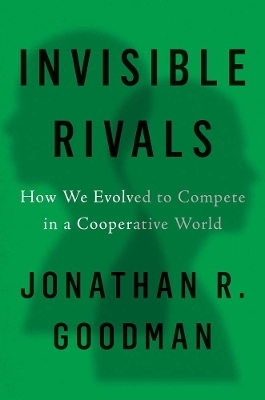
Invisible Rivals
How We Evolved to Compete in a Cooperative World
Seiten
2025
Yale University Press (Verlag)
978-0-300-27435-6 (ISBN)
Yale University Press (Verlag)
978-0-300-27435-6 (ISBN)
- Noch nicht erschienen (ca. August 2025)
- Versandkostenfrei innerhalb Deutschlands
- Auch auf Rechnung
- Verfügbarkeit in der Filiale vor Ort prüfen
- Artikel merken
A multidisciplinary view of how our competitive and cooperative natures make us human
For centuries, people have argued about whether humans are moral animals—good or bad, cooperative or competitive, altruistic or selfish. The debates continue today, dressed up in the language of modern science. In this book, Jonathan R. Goodman makes the case for synthesizing the two sides. Drawing on insights from anthropology, evolutionary biology, and philosophy, he argues that rather than being fundamentally cooperative or competitive, we are capable of being both—and of exploiting each other when there is an opportunity to do so.
The core of invisible rivalry is how we make ourselves and others believe that we are acting cooperatively even as we manipulate those around us for our own benefit. In confronting this collective tendency toward self-interest, Goodman says, we can make the fundamental first step in fixing the breakdown of trust in society. Consequently, we will be better able to combat the myriad issues we face today, including widespread inequality, misinformation in a new technological environment, and climate change.
For centuries, people have argued about whether humans are moral animals—good or bad, cooperative or competitive, altruistic or selfish. The debates continue today, dressed up in the language of modern science. In this book, Jonathan R. Goodman makes the case for synthesizing the two sides. Drawing on insights from anthropology, evolutionary biology, and philosophy, he argues that rather than being fundamentally cooperative or competitive, we are capable of being both—and of exploiting each other when there is an opportunity to do so.
The core of invisible rivalry is how we make ourselves and others believe that we are acting cooperatively even as we manipulate those around us for our own benefit. In confronting this collective tendency toward self-interest, Goodman says, we can make the fundamental first step in fixing the breakdown of trust in society. Consequently, we will be better able to combat the myriad issues we face today, including widespread inequality, misinformation in a new technological environment, and climate change.
Jonathan R. Goodman is an interdisciplinary writer and researcher based at Cambridge Public Health, University of Cambridge. He has written for numerous publications, including New Scientist, Nature, The Guardian, and Scientific American. He lives in London, UK. Robert A. Foley is emeritus professor of human evolution at the University of Cambridge, a senior fellow of King’s College, Cambridge, a fellow of the Alan Turing Institute, and a fellow of the British Academy. He is based in Cambridge.
| Erscheint lt. Verlag | 26.8.2025 |
|---|---|
| Vorwort | Robert A. Foley |
| Zusatzinfo | 8 b-w illus. |
| Sprache | englisch |
| Maße | 140 x 216 mm |
| Themenwelt | Geisteswissenschaften ► Psychologie ► Allgemeine Psychologie |
| Geisteswissenschaften ► Psychologie ► Sozialpsychologie | |
| Naturwissenschaften ► Biologie ► Evolution | |
| ISBN-10 | 0-300-27435-1 / 0300274351 |
| ISBN-13 | 978-0-300-27435-6 / 9780300274356 |
| Zustand | Neuware |
| Haben Sie eine Frage zum Produkt? |
Mehr entdecken
aus dem Bereich
aus dem Bereich
wie Affekte innere Entwicklung ermöglichen
Buch | Softcover (2023)
Klett-Cotta (Verlag)
30,00 €
Buch | Softcover (2024)
Hogrefe Verlag
34,95 €


